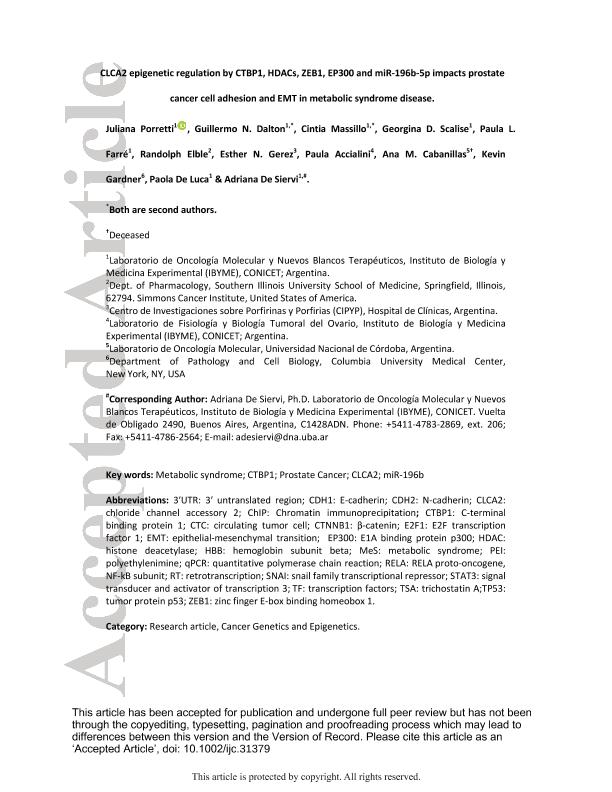Artículo
CLCA2 epigenetic regulation by CTBP1, HDACs, ZEB1, EP300 and miR-196b-5p impacts prostate cancer cell adhesion and EMT in metabolic syndrome disease
Porretti, Juliana Carla ; Dalton, Guillermo Nicolás
; Dalton, Guillermo Nicolás ; Massillo, Cintia Lorena
; Massillo, Cintia Lorena ; Scalise, Georgina Daniela; Farré, Paula Lucía
; Scalise, Georgina Daniela; Farré, Paula Lucía ; Elble, Randolph; Gerez, Esther Noemi
; Elble, Randolph; Gerez, Esther Noemi ; Accialini, Paula Lucia
; Accialini, Paula Lucia ; Cabanillas, Ana Maria de Los A.
; Cabanillas, Ana Maria de Los A. ; Gardner, Kevin; de Luca, Paola
; Gardner, Kevin; de Luca, Paola ; de Siervi, Adriana
; de Siervi, Adriana
 ; Dalton, Guillermo Nicolás
; Dalton, Guillermo Nicolás ; Massillo, Cintia Lorena
; Massillo, Cintia Lorena ; Scalise, Georgina Daniela; Farré, Paula Lucía
; Scalise, Georgina Daniela; Farré, Paula Lucía ; Elble, Randolph; Gerez, Esther Noemi
; Elble, Randolph; Gerez, Esther Noemi ; Accialini, Paula Lucia
; Accialini, Paula Lucia ; Cabanillas, Ana Maria de Los A.
; Cabanillas, Ana Maria de Los A. ; Gardner, Kevin; de Luca, Paola
; Gardner, Kevin; de Luca, Paola ; de Siervi, Adriana
; de Siervi, Adriana
Fecha de publicación:
08/2018
Editorial:
John Wiley & Sons Inc
Revista:
International Journal of Cancer. Journal International du Cancer
ISSN:
0020-7136
Idioma:
Inglés
Tipo de recurso:
Artículo publicado
Clasificación temática:
Resumen
Prostate cancer (PCa) is the most common cancer among men. Metabolic syndrome (MeS) is associated with increased PCa aggressiveness and recurrence. Previously, we proposed C-terminal binding protein 1 (CTBP1), a transcriptional co-repressor, as a molecular link between these two conditions. Notably, CTBP1 depletion decreased PCa growth in MeS mice. The aim of this study was to investigate the molecular mechanisms that explain the link between MeS and PCa mediated by CTBP1. We found that CTBP1 repressed chloride channel accessory 2 (CLCA2) expression in prostate xenografts developed in MeS animals. CTBP1 bound to CLCA2 promoter and repressed its transcription and promoter activity in PCa cell lines. Furthermore, we found that CTBP1 formed a repressor complex with ZEB1, EP300 and HDACs that modulates the CLCA2 promoter activity. CLCA2 promoted PCa cell adhesion inhibiting epithelial–mesenchymal transition (EMT) and activating CTNNB1 together with epithelial marker (CDH1) induction, and mesenchymal markers (SNAI2 and TWIST1) repression. Moreover, CLCA2 depletion in PCa cells injected subcutaneously in MeS mice increased the circulating tumor cells foci compared to control. A microRNA (miRNA) expression microarray from PCa xenografts developed in MeS mice, showed 21 miRNAs modulated by CTBP1 involved in angiogenesis, extracellular matrix organization, focal adhesion and adherents junctions, among others. We found that miR-196b-5p directly targets CLCA2 by cloning CLCA2 3′UTR and performing reporter assays. Altogether, we identified a new molecular mechanism to explain PCa and MeS link based on CLCA2 repression by CTBP1 and miR-196b-5p molecules that might act as key factors in the progression onset of this disease.
Palabras clave:
CLCA2
,
CTBP1
,
METABOLIC SYNDROME
,
MIR-196B
,
PROSTATE CANCER
Archivos asociados
Licencia
Identificadores
Colecciones
Articulos(IBYME)
Articulos de INST.DE BIOLOGIA Y MEDICINA EXPERIMENTAL (I)
Articulos de INST.DE BIOLOGIA Y MEDICINA EXPERIMENTAL (I)
Citación
Porretti, Juliana Carla; Dalton, Guillermo Nicolás; Massillo, Cintia Lorena; Scalise, Georgina Daniela; Farré, Paula Lucía; et al.; CLCA2 epigenetic regulation by CTBP1, HDACs, ZEB1, EP300 and miR-196b-5p impacts prostate cancer cell adhesion and EMT in metabolic syndrome disease; John Wiley & Sons Inc; International Journal of Cancer. Journal International du Cancer; 143; 4; 8-2018; 897-906
Compartir
Altmétricas



